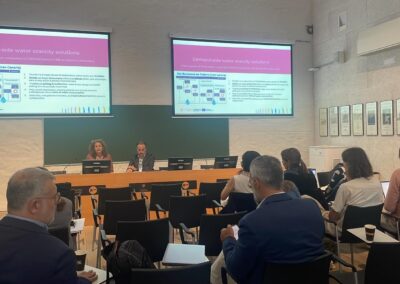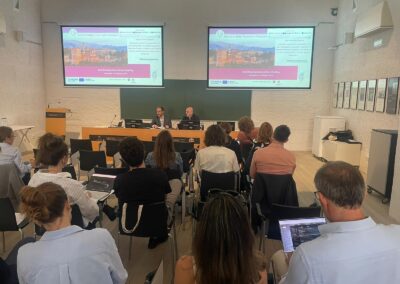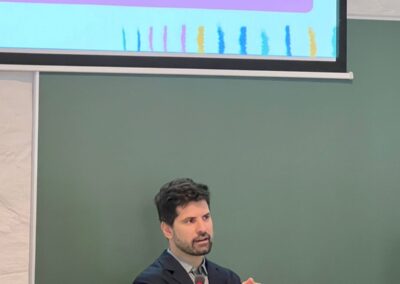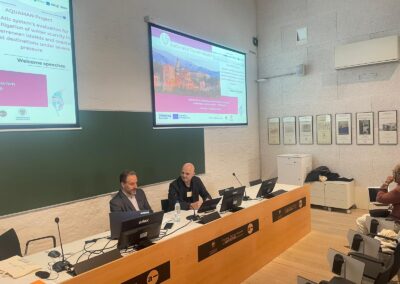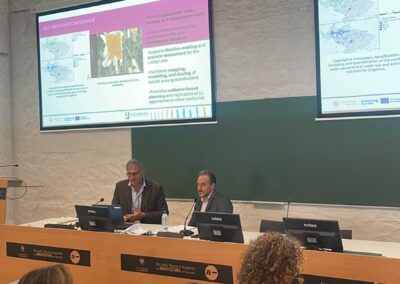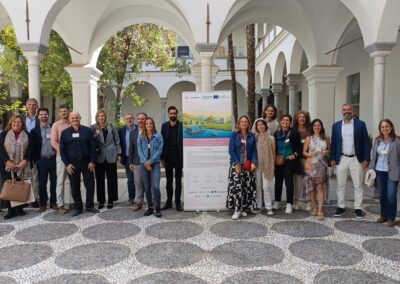AQUAMAN partners share the catalogue of transferable solutions with stakeholders, fostering knowledge exchange alongside other Interreg Euro-MED thematic projects
The Blue Horizons Workshop: Innovative Water Solutions for Tourism and Climate-Resilient Regions gathered over 70 participants both on-site & on-line at the Higher Technical School of Architecture (ETSAG – University of Granada) in Granada, Spain. The workshop, organized by El legado Andalusí Andalusian Public Foundation (Regional Ministry of Culture and Sport of Andalusia, Spain, focused on sharing practical strategies to manage water scarcity in Mediterranean islands and coastal tourist regions.
The event was open by Juan Jesús Ruiz, from El Legado Andalusí Andalusian Public Foundation, and Francisco Abarca, Deputy Director of ETSAG – UGR, who emphasized the importance of international cooperation in water management and sustainable tourism.
The workshop then showcased the Blue Horizons Catalogue of Transferable Solutions, coordinated by Elena Koumaki and Tadej Stepisnik Perdih from the National Technical University of Athens. The catalogue compiles innovative approaches and best practices from all AQUAMAN project partners, offering technical, nature-based, and hybrid solutions such as constructed wetlands for wastewater treatment and green roofs for urban stormwater management.

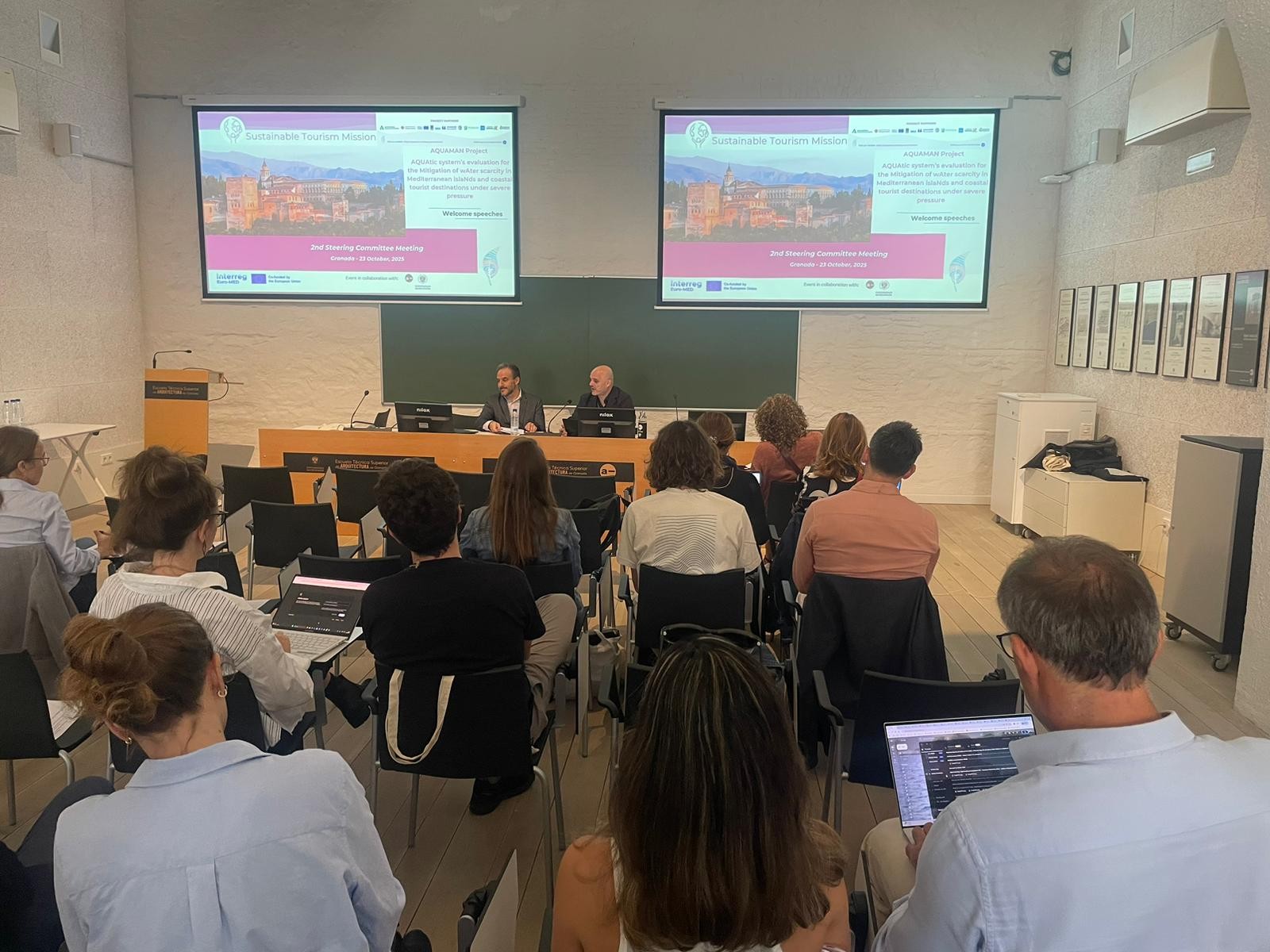
Ioannis Mardikis from the European Public Law Organisation (EPLO) in Athens presented the Water Rethink Project, highlighting innovative strategies to optimize water use in tourism regions. From Portugal, Patricia Malta introduced the Save Water Label, an initiative promoting sustainable water practices in tourism businesses. Natalia García Gareta, representing the Regional Ministry of Tourism and Andalucía Exterior (Spain), explained European grants supporting water reuse and efficiency in the hospitality sector.
Other presentations included Manuel Sapiano from the Energy and Water Agency in Malta, who discussed Mediterranean policy frameworks for non-conventional water resources and smart water governance. Fernando Nardi, Associate Professor at the University of Rome Tor Vergata, presented the NEXUS management plans, a multi-sectoral approach for sustainable water governance. Finally, Ana García López from the University of Granada highlighted synergies with the Interreg Euro-MED HERIT ADAPT Project, showcasing the Alhambra as a model of sustainable tourism and heritage preservation.
Participants engaged in lively discussions on holistic water governance, climate-resilient strategies, and the practical implementation of solutions across Mediterranean contexts.
The Blue Horizons Workshop marks an important step in the AQUAMAN Project’s mission to transfer innovative water solutions to territories facing critical water scarcity, laying the groundwork for future strategic actions and reinforcing the region’s resilience against climate challenges.
“Blue Horizons: Innovative water solutions for tourism and climate-resilient regions”, a document produced by the Interreg Euro-MED AQUAMAN Project (AQUAtic systems’ evaluation for the Mitigation of wAter scarcity in mediterranean islaNds and coastal tourist destinations under severe pressure) serves as a comprehensive and strategic repository designed to advance sustainable water management in Mediterranean regions, particularly in tourism-driven and climate-vulnerable territories. It consolidates a portfolio of “ready-to-use” and adaptable solutions comprising technical interventions, holistic resource management plans, and, with a strong focus on policy recommendations aimed at overcoming institutional, regulatory, and societal barriers.
Its primary purpose is to enable the valorization of non-conventional water sources, the reduction of water consumption, and the minimization of distribution losses through integrated, site-specific strategies. By aligning innovative technologies with supportive governance frameworks, the catalogue facilitates both immediate implementation and long-term policy transformation. This document has been coordinated by the partner National Technical University of Athens supported by the El legado andalusí Andalusian Public Foundation (Regional Ministry of Culture and Sport of Spain, LP) with the solutions provided by all partners and Associated Partners of Interreg Euro-MED AQUAMAN Project: European Law Organisation (EPLO, Greece), Small Islands Organisation (France), University of La Laguna – Department of Applied Economics and Quantitative Methods (Spain), University of Rome Tor Vergata – Department of Civil Engineering and Computer Science (Italy), Energy and Water Agency (Malta), Tourism of Portugal and Ponza Municipality (Italy). Last, it relied on the involvement of two Associated Partners to the Project: the Regional Ministry of Tourism and Andalucia Exterior (Andalusia, Spain) and ADENE (Portugal Energy Agency).
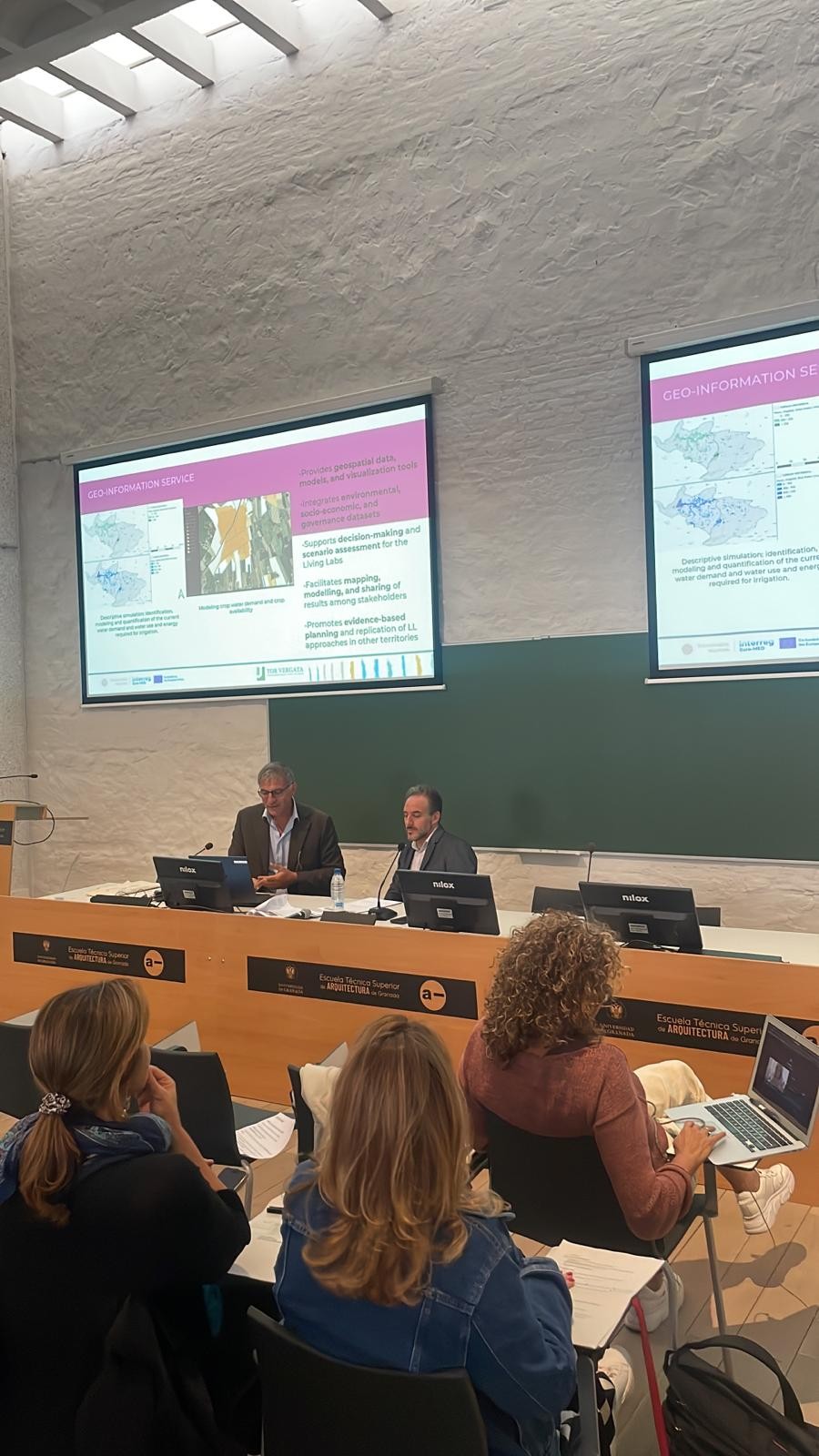

This document brings together, therefore, a wide range of strategies, projects, and initiatives that collectively aim to foster sustainable water management across the Mediterranean region. It compiles actions funded under major European frameworks, such as Interreg Euro-MED Program, Interreg Italia-Malta Program, Interreg Italy-France Maritime Program, Horizon 2020, Horizon Europe, PRIMA Programme, LIFE integrated Projects, together with other national initiatives and locally driven measures.
Each of these projects contributes unique expertise, tools, and financial mechanisms that complement one another. For instance, innovative research projects like FIT4REUSE and NEXUS-NESS provide technical knowledge, while operational projects such as Remedies (Horizon 2020 Program) enable large-scale implementation of water efficiency and circular management strategies.
The document put a particular emphasis on the Interreg Euro-MED Programme (2021–2027), which plays a pivotal role in promoting transnational cooperation across Mediterranean countries. Through this programme, diverse regions are supported in adopting innovative, nature-based, and resource-efficient solutions that address water scarcity, enhance resilience, and reduce environmental pressures in tourism-driven and climate-sensitive areas.
Its alignment with the Sustainable Development Goals (SDGs) – including Clean Water and Sanitation, Climate Action, Sustainable Cities and Communities, and Responsible Consumption and Production – underscores its role as both a technical and a governance-oriented instrument.
Last, this Catalogue is not merely a technical compendium but wants to be a policy-influencing framework, designed to shape the conditions under which nature-based and hybrid water solutions can thrive. By bridging science, technology, and policy, it provides a pathway towards circular, climate-resilient, and equitable water management systems across the Mediterranean.



